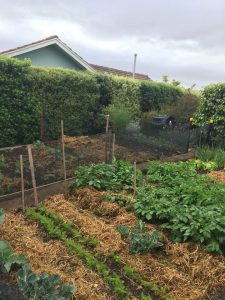A HEALTHY, NUTRITIOUS DIET HELPS TO SUPPORT YOUR IMMUNE SYSTEM
All around the world people’s lives are being severely impacted by COVID-19. On the 20th of March, Dr.Tedros Adhanom Ghebreyesus (who is the Director-General of World Health Organisation (WHO)) advised people to maintain a robust immune system. He said “First, eat a healthy and nutritious diet, which helps your immune system to function properly.”
 Many of our program partners have had to close the door on their organisations as they’ve been put into lockdown. Our program partner in the Philippines – The Muravah Foundation has said, “We’re in lockdown and taking the opportunity to get all our team building home vegie gardens. With so many out of work and no safety net they are getting hungry so there’s our catalyst for change.” In very little time some plants will have grown and be producing food for them. Now more than ever local food plants have a key role to play in our diet.
Many of our program partners have had to close the door on their organisations as they’ve been put into lockdown. Our program partner in the Philippines – The Muravah Foundation has said, “We’re in lockdown and taking the opportunity to get all our team building home vegie gardens. With so many out of work and no safety net they are getting hungry so there’s our catalyst for change.” In very little time some plants will have grown and be producing food for them. Now more than ever local food plants have a key role to play in our diet.
Quite possibly there are people in your community who are wondering how they are going to feed themselves and their families because of COVID-19. By growing some of their own food it will give people something positive to engage in, and importantly, nutritious food. For those who have lost employment, this helps to give them something immediately to focus on and in very little time they can be benefiting from their effort. What’s more, gardening is proven to be good for our mental health, which is understandably a huge issue at the moment.
We can provide a soft leaflet for you to print and distribute that is specific to the region you live in. It would contain the following information:
- 15 edible plants (3 from each of the major food groups), that are known to grow in your area, that are high in the most beneficial nutrients.
- Each plant will have information including:
- Common name
- Scientific name
- Key points regarding use
- Key points regarding cultivation
- Information on nutrients and why they are important.
- Information on how to start a garden.
- Each plant will have information including:
This leaflet would then allow anybody to start their own garden, whether it be one pot in an apartment, or turning over some lawn in their yard. For very little effort, it could have such a positive impact.
Eating a balanced diet is vital for our health and well-being. Food provides our bodies with the energy, proteins, vitamins, and minerals to live, grow, and stay active. We need a wide variety of different foods to provide the right amounts of nutrients to live healthy and productive lives.
Please contact us for more detail: info@foodplantsolutions.org
View the newsletter: https://foodplantsolutions.org/april-2020-newsletter/
THE IMPORTANCE OF LOCAL FOOD PLANTS – BRUCE FRENCH AO
Good nutrition can help reduce disease and infections, my heart still aches for the over 6 million children worldwide each year who don’t live long enough to get to school, due to under-nutrition. (And another 6 million die from disease.) On a visit to a hospital in the highlands of Papua New Guinea as a part of a nutrition course I was doing over 45 years ago, I saw about 28 children dying of malnutrition and this was enough motivation for me to think someone should do something.
can help reduce disease and infections, my heart still aches for the over 6 million children worldwide each year who don’t live long enough to get to school, due to under-nutrition. (And another 6 million die from disease.) On a visit to a hospital in the highlands of Papua New Guinea as a part of a nutrition course I was doing over 45 years ago, I saw about 28 children dying of malnutrition and this was enough motivation for me to think someone should do something.
Over the years I have had top scientists tell me I was wasting my life documenting local less well-known plants because to build a career I need to specialise with one variety of one well known plant. So, as the majority of non-commercial horticulturalists and scientists are now calling for the re-discovery of well adapted and highly nutritious local plants, I feel gratified. At last they are realising that sustainable food production and good nutrition and feeding an increasing world population requires a more soundly agro-ecological approach. So I feel that my 50 years of plodding has been worth it to now end up with the world’s most comprehensive database on the amazing food plant options available free to all. I have read a multitude of scientific reports and articles that say this is the only way for the future of the planet and we need to re-think our whole approach to agriculture.
View the newsletter: https://foodplantsolutions.org/april-2020-newsletter/